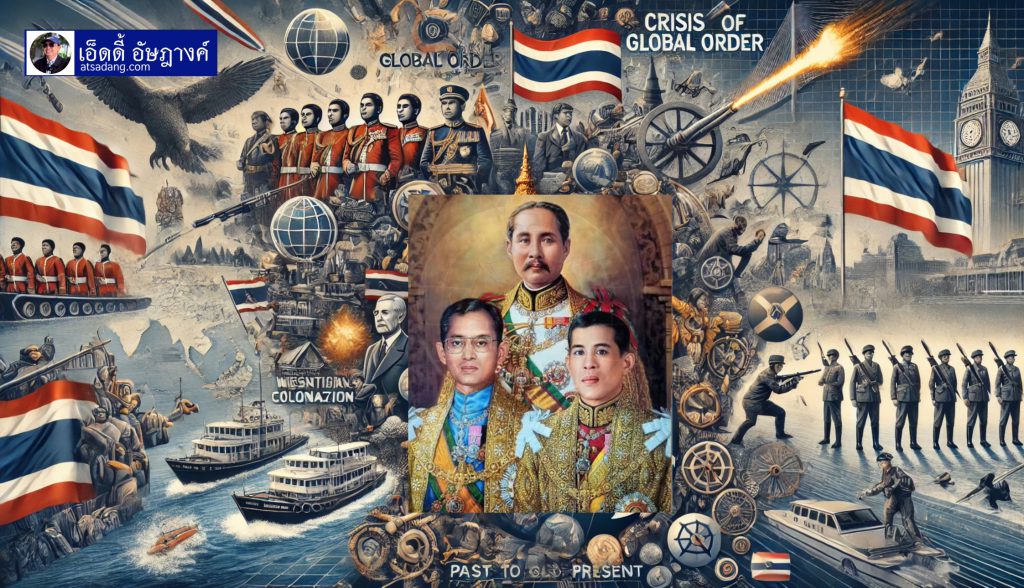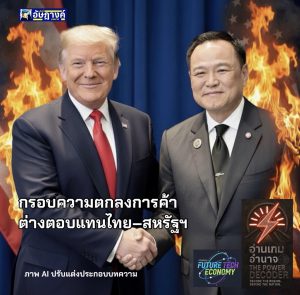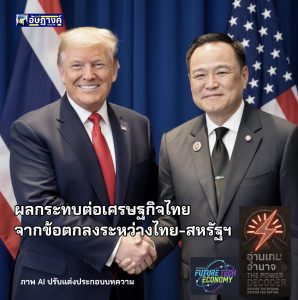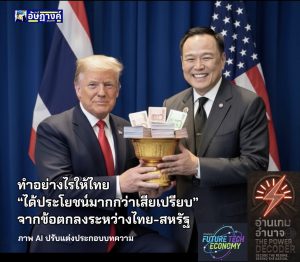
By Atsadang Yommanak
Thailand and the Influence of Superpowers on the Global Order
What is Global Order, and does it really exist?
Thailand today faces political interference much like it did over a hundred years ago during the Western colonial era. The methods may have changed, but the core remains the same: the Western superpowers’ efforts to organize the world, believing they are the liberators bringing happiness to developing nations.
Thailand’s political instability and division can be resolved through diplomatic strategies, and we need a leader with expertise in international relations.
Just like King Rama V, who skillfully dealt with Western powers through diplomacy, Thailand avoided colonization. Thus, in the modern era, we need a leader like King Rama V — one with diplomatic and managerial skills, to balance power from all directions.
“I believe Thailand today needs a leader skilled in diplomacy and international affairs to help resolve internal political problems.”
Historically, Thailand needed warrior leaders like King Taksin and King Rama I. Later, we needed economic leaders like King Rama III. Ultimately, we required King Rama V, a master of diplomacy, to balance Western power and save us from colonization.
In democratic times, sometimes we need military leaders, and sometimes economic experts. But today, we need a leader with strong diplomatic and international relations skills to balance Western power, just as in King Rama V’s time. This will eventually resolve internal political problems, which stem from external interference by Western superpowers’ efforts to organize the world.
The beginning of the “Global Order“ stems from the concept of the “White Man’s Burden“ The Western intervention in Asia and Africa was often justified by the belief that Western civilization was more advanced and that they had a duty to “improve” or “civilize” societies in less developed countries. This perspective has been widely criticized as a form of oppression and destruction of local cultures. Scholars such as Edward Said and Frantz Fanon argue that these interventions were more about exploitation than genuine development.
Scholar Opinions and Analysis:
1. Theory of Imperialism:
– Many scholars view Western intervention as part of imperialism, where Western nations controlled the economies, politics, and cultures of colonies for their own benefit, using the justification of bringing civilization and prosperity.
2. Anti-Imperialist Views and Independence Movements:
– Asian and African nations were negatively impacted by Western interference, leading to the collapse of traditional governance and exploitation of resources. Thinkers like **Frantz Fanon** discussed the psychological and social harm caused by colonization.
3. Post-Colonial Development:
– After gaining independence, many nations continued to struggle with inequality and social conflict. Scholars like **Kwame Nkrumah** argue that these nations must build their own systems suited to their unique contexts.
Supporting Research:
– Research on the governance and impacts of imperialism, such as the work of Benedict Anderson** on nationalism in Southeast Asia or Chinua Achebe on Africa.
– Nobel Prize-winning economist Amartya Sen suggests that Western development models are not the only path to prosperity.
Westerners often believed themselves to be more civilized and used this notion to justify intervention in Asia and Africa. However, many scholars view such interventions as oppressive, damaging local cultures, and creating long-term social, political, and economic harm.
Global Order
World Order refers to the international political process and the creation of a framework often led by superpowers. These powers attempt to dictate how countries should act globally in areas such as economics, politics, and military matters. This system aims to control global situations for stability, conflict prevention, and resource management. The policy is often driven by influential countries like the U.S. or Western alliances seeking to establish global political and economic frameworks that align with their interests.
Modern Global Order:
1. Political and Economic Relations:
– The current World Order often involves controlling economies through international institutions like the IMF or the WTO, which influence developing countries’ economic directions.
– Politically, Western powers like the U.S. use diplomacy or military strategies to intervene in other countries’ internal affairs, claiming to promote peace, stability, or human rights. However, there is often skepticism about whether these interventions serve their own interests.
2. Examples of World Order:
– Interventions in the Middle East, such as the 2003 invasion of Iraq and the 2011 military intervention in Libya, are often cited as attempts by Western powers to organize the region’s political systems under the guise of promoting democracy and security. However, these actions often lead to prolonged instability and conflict.
3. Human Rights as a Justification:
– Western powers frequently invoke human rights and democracy as reasons for intervening in Asian and African countries, such as supporting opposition groups or applying economic pressure to compel changes in governance or economic management. However, such actions are sometimes seen as a way for superpowers to further their own interests under the guise of global norms.
Global Order: Is It Right?
Supporters:
World Order is viewed as essential for global stability, promoting democracy, protecting human rights, and preventing international conflicts. For example, organizations like the United Nations (UN) represent efforts to create a world order for cooperation and sustainable development.
Critics:
Critics argue that World Order is often an excuse for superpowers to intervene in weaker countries and protect their interests, leading to instability and cultural destruction. Thinkers like **Frantz Fanon** see Western political interventions as serving superpowers rather than helping developing nations.
The concept of Global Order is complex, with both positive and negative aspects. While it may promote stability, it also raises questions about power dynamics and exploitation.
Historical Roots in White Man’s Burden:
Today’s World Order can be seen as an extension of the White Man’s Burden from the imperialist era. This belief justified the colonization of “underdeveloped” nations by claiming the West needed to civilize them, though it often masked ulterior motives like political and economic gain.
White Man’s Burden in History:
The idea emerged during 19th and early 20th-century imperialism when Western powers believed they had a duty to spread knowledge and culture to their colonies, not purely for “helping” but also for economic and political benefits.
The Modern Global Order
In the modern era, although the form of intervention has changed, certain ideas from the White Man’s Burden still persist in the form of global organization. Western countries continue to play a significant role in setting global rules and standards through international institutions like the United Nations (UN) or the International Monetary Fund (IMF), which are heavily influenced by superpowers. Western intervention often cites human rights, democracy, and global stability as justifications.
Similarities between White Man’s Burden and Global Order:
1. Moral Justifications for Intervention:
– Similar to the past, current interventions often use moral reasons, such as protecting human rights or promoting democracy, as a pretext to interfere in other nations.
2. Economic Dominance:
– Global financial institutions like the IMF and WTO often impose conditions on developing nations that force them to follow policies set by superpowers, akin to how Western nations once controlled their colonies.
Differences between “White Man’s Burden” and “Global Order”:
– Shift in Global Context: Modern interventions no longer take the form of military conquest or direct colonization, but rather political, economic, and cultural influence through diplomacy and international negotiations.
– International Cooperation: While interventions still occur, international institutions and organizations work to foster cooperation between nations to maintain peace and stability, a concept that has evolved from the imperialist era.
Is it justified?
Intervention in the name of global order is a complex issue:
“Supporters“ argue that intervention helps create stability, protects human rights, and reduces conflict, bringing peace and progress to developing countries.
“Critics“ see it as a new form of domination, causing economic and political issues, similar to colonialism.
Today’s global order stems from the “White Man’s Burden” concept, continuing economic and political dominance without direct colonization.
Countries like Thailand have developed strategies to navigate geopolitical challenges, balancing influences from superpowers like the U.S. and China.
Key Strategies for Managing or Addressing Global Order:
1. Political Neutrality: Thailand maintains “equidistance” with major powers like China and the U.S., fostering relationships with various countries to avoid pressure from any one side.
2. Economic Development and Reforms: Thailand focuses on green infrastructure and modern industries to attract foreign investment, aligning with national interests.
3. Regional Cooperation: Strengthening economic and political ties within ASEAN reduces reliance on Western markets.
4. Expertise and Technology: Engaging experts and using data-driven governance enhances strategic decision-making in complex global contexts.
5. Cultural Identity: Promoting local culture through soft power reduces reliance on Western influence.
6. Education Reform: Emphasizing technology and innovation ensures Thailand’s competitiveness.
7. Food and Energy Security: Strengthening these areas helps mitigate risks from global market instability.
These strategies aim to help Thailand navigate the modern global order sustainably.
Did you know that in the history of Thailand, during the reign of King Rama V, the country successfully resisted Western colonization, allowing Thailand to remain independent? King Rama V employed strategies similar to modern diplomatic tactics: national development, maintaining neutrality, and building alliances.
King Rama V modernized Siam through reforms in administration, education, and infrastructure. He maintained political neutrality and strategically negotiated with Western powers to preserve sovereignty. He also built diplomatic ties with European nations, further securing Siam’s independence in a colonial-dominated era.
Countries like Thailand used diplomacy and adaptation to retain their sovereignty during the colonial period, facing ongoing political and diplomatic challenges.
Therefore, it can be said that King Rama V was a forward-thinking leader. His approach to handling the global order efforts of the past, known as the “White Man’s Burden,” mirrors the strategies modern scholars use to study and manage today’s global order.
Thailand should look back and study King Rama V’s strategies as a model to deal with current global challenges. If we follow his successful methods, today’s political turmoil could be resolved more easily and unexpectedly calmed, as it stems from the West’s ongoing efforts to shape the global order.
…………………………………………………….
Both “World Order“ and “Global Order“ are commonly used, but they are slightly different in emphasis.
– “World Order“: This term often refers to the broader structure of power, politics, and influence among nations, particularly how superpowers shape the rules of international relations.
– “Global Order“: This term typically emphasizes a more inclusive and interconnected system, focusing on global governance, international institutions, and cooperation across various sectors (political, economic, environmental).



